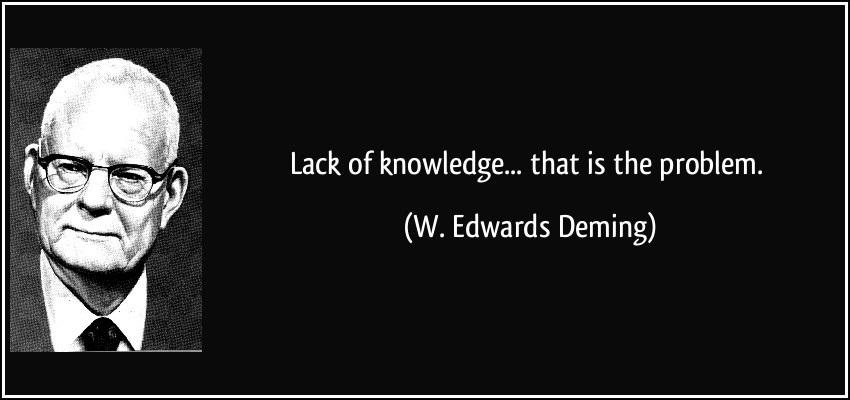
I remember a study a while back that talked about this, but recently I came across the Dunning–Kruger effect:
"In the field of psychology, the Dunning–Kruger effect is a cognitive bias in which people mistakenly assess their cognitive ability as greater than it is." (Wikipedia)
It is a cautionary tale for all of us because it says that at the worst end of ignorance one doesn't even know there is a problem. As a programmer, it tells me that assumptions are bad and a bit of research is always warranted. As a human being, it reminds me to be humble.
Of course, Mr. Deming (quoted above) isn't the only one to have observed this, reminding us that those who forget history are doomed to repeat it:
- Confucius (551–479 BC), who said, "Real knowledge is to know the extent of one's ignorance".
- The philosopher Socrates (470–399 BC), who interpreted a prophecy from the Delphic oracle, said that he was wise despite feeling that he did not fully understand anything, as the wisdom of being aware that he knew nothing.
- Playwright William Shakespeare (1564–1616), who said, "The fool doth think he is wise, but the wise man knows himself to be a fool" (As You Like It, V. i.)
- The poet Alexander Pope (1688–1744), who wrote in An Essay on Criticism, 1709: "A little learning is a dangerous thing"
- Henry Fielding (1707–1754), who, in the novel The History of Tom Jones, a Foundling, wrote: "For men of true learning, and almost universal knowledge, always compassionate [pity] the ignorance of others; but fellows who excel in some little, low, contemptible art, are always certain to despise those who are unacquainted with that art."
- The naturalist Charles Darwin (1809–1882), who said, "Ignorance more frequently begets confidence than does knowledge"
- Philosopher Friedrich Nietzsche (1844–1900), who wrote in Human, All Too Human (aphorism 483), "The Enemies of Truth. — Convictions are more dangerous enemies of truth than lies."
- W. B. Yeats (1865–1939), who, in the poem The Second Coming, said: "The best lack all conviction, while the worst / Are full of passionate intensity."
- The philosopher and mathematician Bertrand Russell (1872–1970), who said, "One of the painful things about our time is that those who feel certainty are stupid, and those with any imagination and understanding are filled with doubt and indecision."
- A quip attributed to Mark Twain (1835–1910), though possibly apocryphal: "When I was a boy of 14, my father was so ignorant I could hardly stand to have the old man around. But when I got to be 21, I was astonished at how much the old man had learned in seven years."
No comments:
Post a Comment